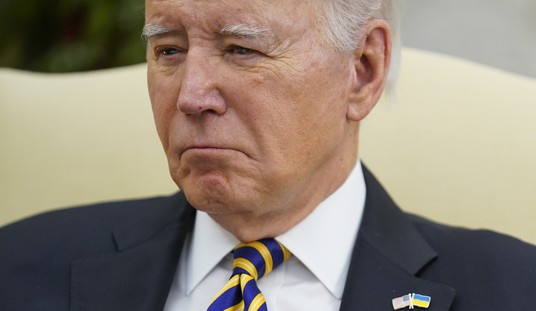On Christmas Day, Tom Friedman gave his readers what may possibly be his worst columns ever (having written so many bad columns, this is of course a judgment call). Here he joins the less influential John B. Judis of The New Republic in defending the status of Chuck Hagel as the leading nominee for the position of secretary of Defense.
Like Judis, Friedman argues that it is precisely because Hagel’s views are not “mainstream” that he would be the perfect secretary of Defense. He is upset that Hagel has been “smeared as an Israel-hater at best and an anti-Semite at worst.” He buys the line of the Obama administration that Hagel is “committed to Israel’s survival” but is to be praised because he, like Friedman himself, knows what is best for Israel — a besieged nation trying to defend its right to exist in a world composed of implacable enemies. Thus, Friedman writes, Hagel is to be praised for arguing that favoring Israel’s survival does not mean “going along with Israel’s self-destructive drift into settling the West Bank and obviating a two-state solution.”
Let us pause to dissect the above paragraph. Israel, in Friedman’s eyes, is the nation that is doing all it can to stop a two-state solution.
This, of course, is his first major error. Prime Minister Netanyahu has reversed the course of previous Israeli leaders in publicly supporting that goal. What really irks Friedman, however, is Netanyahu’s clear-sighted realization that the Palestinian leadership has been consistently intransigent from 1948 on in proclaiming its lifelong opposition to any agreement that recognizes Israel’s right to exist as a Jewish state. In the eyes of its leaders, from those of Fatah to the so-called worse extremists of Hamas, all of Israel is a settlement that must eventually return to Palestinian Arab control. A one-state solution, with an Arab majority eliminating a Jewish nation and creating a subordinate Jewish population.
As David Horovitz explains today in The Times of Israel:
Far from seeking to avoid talks with Abbas [another Friedman charge] Netanyahu has repeatedly shown a desire to re-engage — and … this is recognized everywhere from Amman to Washington. The problem isn’t Netanyahu, it’s Abbas …The PA president wants a state all right, but he doesn’t want to make peace with Israel — hence his material breach of the bilateral process and his scamper to endorsement by the UN General Assembly.
Horovitz acknowledges that the announcement of the new settlements in the E1 corridor is a “unilateral Israeli response” to Abbas’ policy, and that Israel needs to show “it does not accept the purported new ‘legitimacy’ of ‘Palestine’ and the consequent asserted international legal designation of the West Bank as occupied Palestinian territory — and will not be deterred from taking actions to underline its claims to that land.”
He notes, as does the prime minister’s office, that even in the left’s much heralded citation of Ehud Olmert’s 2008 map for Abbas of West Bank territory that Israel would retain — a map that supposedly was the most magnanimous offer by an Israeli prime minister to Abbas, and which the PA leader rejected — “Israel would retain” that portion of land for itself. As Horovitz writes: “Gaza and the West Bank are 50 miles apart, and that’s no bar to a two-state solution,” and in the E1 corridor, “overpasses, underpasses and bypasses can maintain Palestinian contiguity.”
Mr. Friedman should also take a look at Alan Dershowitz’s important column: “Hagel: The Wrong Man.” We must pause to note that Professor Dershowitz met with the president in the Oval Office before the election, and came out proclaiming the president’s commitment to Israel and to stopping a nuclear Iran — and publicly endorsed him. Now I wonder if he is having second thoughts about that decision, given that he is saying in effect that in supporting Hagel, Obama is making the wrong choice. He writes:
Were Chuck Hagel to be nominated as secretary of defense, the Iranian mullahs would interpret President Obama’s decision as a signal that the military option was now, effectively, off the table. It would encourage them to proceed with their development of nuclear weapons without fear of an attack from the United States. It would tell them that if they can endure the pain of sanctions and continue the charade of negotiations, they will ultimately be allowed to win the prize of a deliverable nuclear bomb.
Hagel’s nomination would also validate the fears of Israeli leaders who have never really believed that the United States would attack Iran’s nuclear program even if that were the only way to stop it. It would make an Israeli military attack more likely.
Hagel’s position, he argues, is “the exact opposite” of that which the president says is his announced policy. Dershowitz reasonably asserts that putting a man in the Cabinet as head of the Defense Department who is against the proclaimed administration policy is a disaster in the making. (Remember: Dershowitz is taking Obama at face value, unlike many of this column’s readers, who believe the president does not actually support the kind of policy favored by Alan Dershowitz.)
To Tom Friedman, putting in Hagel is good because it is “healthy to have [these views] included in the president’s national security debates.” Friedman says the president must hear “all the alternatives,” something he supposedly will not hear if Hagel is not secretary of Defense.
Of course, we know that the president regularly reads the vociferously anti-Israel blog posts of Andrew Sullivan, and reads Friedman as well. Does he really need Hagel present just to hear these arguments?
As Dershowitz rightfully says, Hagel in a position of major importance becomes in itself an announcement that the administration is moving strongly in a new anti-Israel direction. Which is why people like John Judis want him in that office.
Another reason Friedman wants Hagel in is because he believes it is in our nation’s interest to engage Hamas, and to negotiate with the terror group — despite the fact that its leaders consistently have made clear their sole goal, never to be abandoned, is the destruction of the Jewish state. Here, Friedman calls Hagel’s views simply “philosophical criticism,” the belief that he prefers a “negotiated solution to Iran’s nuclear program,” a “willingness to engage Hamas to see if it can be moved from its extremism,” the belief that the Pentagon “budget should be cut,” and his “aversion to going to war in places like Iraq and Afghanistan.”
“Philosophical”?
A newspaper columnist like Friedman can make these arguments. But a secretary of Defense who is against his own department? Who wants to cut its budget and to do anything to avert war, including negotiating with enemies who have sworn to do anything necessary, including terrorist attacks, to reach their goal? This reveals only a refusal to acknowledge reality, and a dependence on the delusional belief that he alone can make offers that will make the other side renounce its very raison d’etre.
Here even Friedman is a bit skeptical, and yet he writes that he wants “to test and test again whether a diplomatic deal is possible before any military strike.” But when are such tests of Iran and Hamas to stop? When they already have nuclear weapons, or when Friedman himself says it is time?
To date, it is a commentator like Friedman who continually wants to let Iran play the U.S. while it builds its future nuclear capacity, and who argues regularly for no action until Iran is again tested.
As Dershowitz writes, a Hagel appointment would be understood by Iran to indicate that the new secretary of Defense “would strongly oppose the use of force against Iran’s nuclear program, even as a last resort.” It also would send the message that only those who favor force if necessary are “the Jews.” Hence one cannot minimize, as Friedman does, Hagel’s comment that “the Jewish lobby intimidates a lot of people.” Hagel, as Dershowitz writes, “sees things in terms of Jewish interests versus American interests.” As Dershowitz concludes:
This is not the time to be sending the wrong message, or even a confusing message, to Iran and its surrogates by nominating a man who is widely seen as out of the American mainstream when it comes to support for Israel’s security.
Interestingly, Dershowitz writes that if Hagel were nominated and not confirmed by the Senate, the Iranians would “see the nomination as representing President Obama’s real views on the possible use of force against the Iranian nuclear program,” and would then see his rejection by the Senate as “a reflection of the power of the ‘Jewish lobby’ over the legislature.” Precisely.
The only questions I have are for Professor Dershowitz: Don’t you think that it is indeed possible that the president wants Hagel precisely because the former senator reflects his own views?
If you think the Iranians might consider that as the truth, why doesn’t it occur to you as well?
Indeed, Dershowitz notes that were Hagel actually appointed as secretary of Defense, that “would make military action by the United States or Israel more rather than less likely, because it would embolden the mullahs toward defying any threat of the military option.”
That last point is meant to sway those like Friedman who evidently believe the opposite: that putting Hagel in would take the military option off the table for a long, long time. Dershowitz is explaining that the path they favor will lead precisely to the end they fear most — a nuclear strike against Iran that would embroil the Middle East in a new major war.
The bottom line is that it is time to be wary of the advice given by the so-called “real” friends of Israel who regularly accuse Israel’s defensive policies of being militaristic and wrong, and who continually find hope in Palestinian obstinacy and rejectionism which they proclaim to be reasonable and meriting of a favorable response.
Yes, Thomas Friedman and Chuck Hagel may not be anti-Semitic, although Hagel’s ill-chosen words are rather borderline and most likely revealing of his real sentiments. But with their constant chastising of Israel and their pleas to deal with the likes of Hamas and to make more and more dangerous concessions to the PA, they are misleading the American public to view Israel and its elected leaders as the only impediments to peace in the Middle East.
In doing that, Thomas Friedman especially is using his perch at the New York Times, as its senior foreign policy columnist, to turn Americans against Israel, and to urge them to pressure the United States to move away from supporting its most important ally in the region. All in the name of reason and peace. With friends like that, Israel does not need its current many enemies. Its greatest danger lurks from those who give its leaders bad advice delivered in the name of support.
Related from Barry Rubin:








Join the conversation as a VIP Member